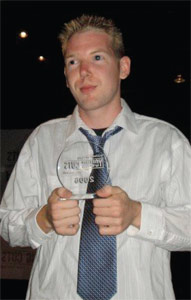Lights, camera, satisfaction

Filmmaker David McGrath on following your dreams
If you were to ask a group full of children what they wanted their future career to be, you would notice two things: first, that some of the jobs mentioned likely don't exist; and second, except in rare circumstances, you would get an answer from every child you asked.
It isn't until later in life that uncertainty sets in — ask an equal number of college students what they want to do for a living and you'll almost certainly get fewer answers. Are we less adventurous as we age? Less courageous or willing to follow our dreams?
"In the '80s, every time I saw a movie that I loved, I wanted to be what the main character was," smiled David McGrath, director and founder of McWrath Productions, based in Toronto. "After I saw Indiana Jones I wanted to be an explorer. After I saw Who Framed Roger Rabbit? I wanted to be a detective. After I saw Batman, I wanted to be Batman. Then when I turned 10, I realized they were all just actors and I decided that is what I wanted to do."
His decision would be short-lived, thanks to the influence of Steven Spielberg and his 1993 film epic Jurassic Park. McGrath describes this as the turning point that would govern his entire adult life. It wasn't the first time Spielberg's work made an impression on McGrath, either; his oldest memory with movies pertains to his mother taking him to see E.T.: The Extra-Terrestrial before he was two years old.
The reason I have trouble believing she took me during the first run of this film is I have memory of sitting in that theatre going crazy with disbelief during the scene when the bikes take off and flies past the moon," his explanation is as jovial as it is skeptical. "I've been told you can't remember anything before three years of age, but I remember that moment very vividly and I've loved movies ever since."
McGrath had direction, and so determined was he that he weathered all manner of adversity along his way. After being rejected from all the post-secondary film production programs he applied to, he opted to take film theory and screenwriting at York University in Toronto. Despite this, he said he's learned much more from simply making films than in four years of studying them.
McGrath has financed each of his films himself, going the extra distance to bring his visions to life — in 2004, he worked like a madman to save $10,000 to shoot his first film, Disfingered. A modern horror film, it focuses on a main character who one day wakes up missing a finger, then begins to lose a finger every time he went to sleep.
McGrath screened the film on the side of Roy Thomson Hall during the Toronto International Film Festival in 2005, paying homage to Atom Egoyan, who screened a film similarly in 1982. Disfingered went on to be official selections at film festivals in Toronto, Montr�al and New York, winning the award for Best Special Effects at the 2006 YoungCuts Film Festival.
The award was a welcome shot of recognition after the effort it took to produce the film, and not only by McGrath — every time the production hit a snag, it took quick thinking and adaptability to keep the project on track. This past summer, Disfingered was featured as a part of the Little Terrors Short Film event at The Projection Booth in Toronto, and the screening caused McGrath to reflect back on the experience.
"I wanted it to be the best first film anyone had ever done and I wanted to shoot it on film and have a dolly with a track and a full crew ... the only reason the film got finished was because I had been lucky enough to convince some very talented and experienced people to work on it. I'm still very proud of that film we all made, but I was the weak link on that crew and the director always needs to be the strongest. So what did I learn? Don't spend $10,000 on your first film. Make three films as cheaply as possible then make your $10,000 film."
In the years since Disfingered was completed, McGrath has written and produced We All Bleed Red — a short film steeped in discrimination and violence — in 2009 and The Actor in 2010. The latter stars comedian Michael MacDonald as a struggling actor, making ends meet teaching acting while falling in love with the school's one—eyed secretary. McGrath admitted that while he may have been na�ve about the process while making his first movie, his expectations were much more realistic for the experience, not to mention being able to see now the value of the advice offered to him by mentors he approached before making his first film.
"Anyone who would offer advice told me to work on sets for a couple years as a production assistant first — at 22 I felt I was too old to wait that long," he explained. Now his advice to film students is the same, albeit perhaps a little more forward.
"If you want to be on a crew in a role like Director of Photography or in post-production like an Editor, go to film school and work on as many projects as you can and try meet as many people as you can. But if you want to be a storyteller then don't waste your money at a film school, use that money to make your films."













